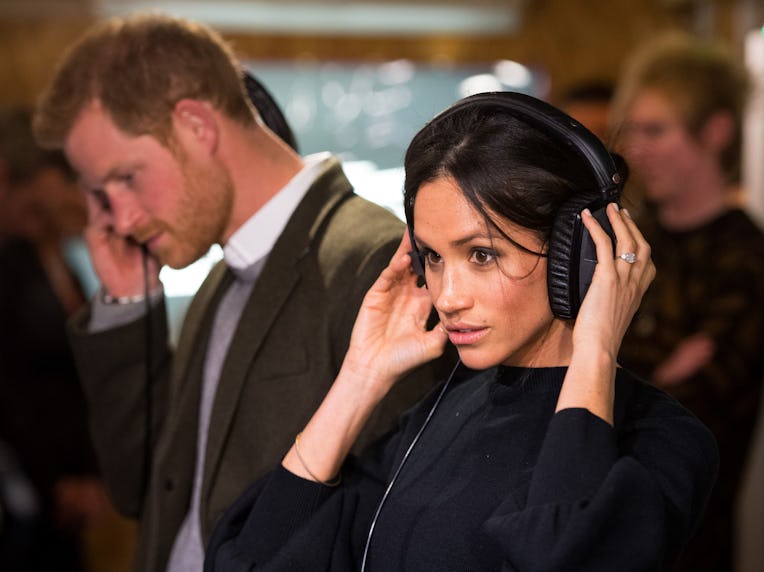Podcaster Laureate Meghan Markle Hosts an Amanda Gorman Open Mic
And a new archetype: annoying

I’ve criticized Archetypes with Meghan in the past for Her Fabulous Duchessery Markle’s unwillingness as a podcast hostess to abandon the premise of dismantling said archetypes— whether that’s “bimbo” or “bitch” or “diva” or “weird ugly loser” — in favor of letting interesting conversations flow naturally. I’ve also criticized her understanding of egalitarian feminism as just a touch “college freshman Intro to Women’s Studies in the year 1999.” The combination of which frequently results in hour-long episodes that only a royalist superfan moonlighting as an intrepid blogger could love. (It seems the numbers agree; according to the Daily Mail, last week’s release with Jameela Jamil currently sits at 77th place on the U.S. Spotify chart, bested by a collection of lullabies for babies.)
Well, apparently, Meghan’s been reading my critiques and has decided to heed my advice to go crazy (sorry, I know I shouldn’t say that word) with it, because there’s been a breakthrough on the Archetypes front: This week’s episode actually approaches what could be considered good.
On today’s show, Meghan is taking on an archetype inspired by a piece of art that a friend gave her. The art, which is in her sitting room, says, “Humankind. Be both.” I can’t find the exact piece of art online, but there’s a $380 Lingua Franca cashmere that bears the same message, which appears to be ripped off from this Tahoe woman’s bumper sticker business. And thus, a theme is born: The penultimate episode of this season of Archetypes is titled “Human, being.”
Meghan starts the episode by interviewing some teen girls after crashing a volleyball practice at her alma mater, Immaculate Heart High School in Los Angeles. She asks them about their familiarity with certain archetypes. Of course, they had been called bitches before. But one of the girls, a feminist hero (to me, at least), tells Meghan that she is less familiar with the ancient term “bimbo.”
“The only time I’ve heard that in recent years is from self-proclaimed bimbos on TikTok,” said the young one. Hahaha, same!
Then Meghan moves on to a fairly provocative interview with Candace Bushnell, the creator of the Sex and the City column in the New York Observer that was eventually optioned for television by Darren Star. If anyone could be held responsible for media that puts women in boxes, it must be her — but not so fast, Bushnell says. Her columns represented all sorts of women, and Star was the one who condensed the entirety of New York into four types, forever brunching. Bushnell never wrote a script for Sex and the City because she was told she “couldn’t do that sort of thing,” and she didn’t make much money on the sale of her column to HBO. “I’m okay,” she says, but she’s angry.
This interview surpassed all my expectations, which previously primarily consisted of looking forward to Meghan having to say the word “sex.” Meghan didn’t insist on making Bushnell litigate the varying etymologies of “single woman of a certain age” or “good girl prepster” or “sex fiend publicist” or “Hey, it’s Che Diaz.” Instead, they discussed the limitations placed on her as a columnist — as opposed to being a “real” writer — and how creators are often shortchanged for their ideas.
Meghan had finally cracked it. For the first time ever, I wanted a longer episode of Archetypes. And then… she tanked it all with another freaking poem. This one was by Amanda Gorman, who was sitting right next to her, ready to perform. The kindest thing I can say about it is that it would’ve been a good poem for one of Meghan’s high schoolers to submit for a poetry contest in English class revolving around the theme “Human, being”:
There is a movement brewing
We are the storm
The very form
Of change
The way forward
Isn’t a road we take
But a road
We make
Forged forth by a future that is female
We will not bail
We will not sway
For where there’s will there’s woman
And where there’s woman
There’s forever a way
It would ultimately lose to a plagiarized take on one of Rupi Kaur’s Milk and Honey poems with some of the words switched out, but the English teacher would hand it back with the note “So powerful #TheFutureIsFemale” underlined twice at the top. Maybe it would even place third.